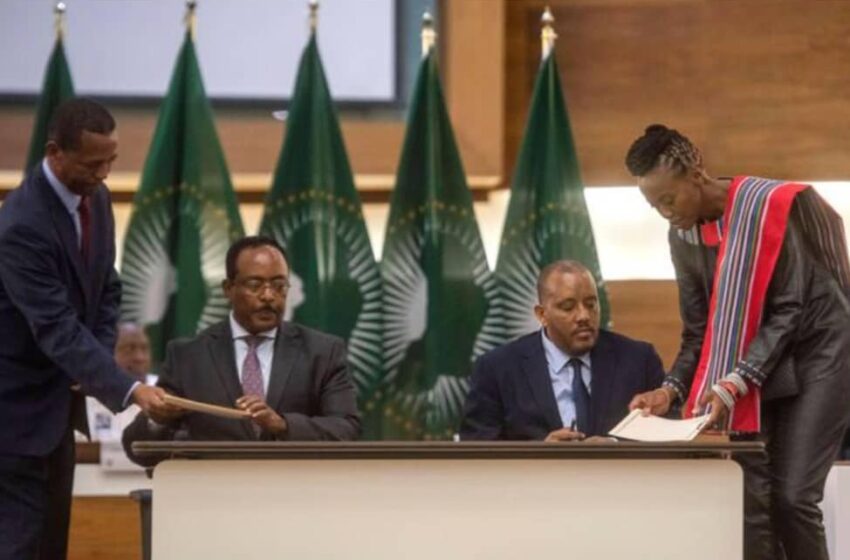
A Year of Unmet Promises: The Ongoing Struggle for Peace, Justice, and Dignity in Tigray
A Journey Betrayed
More than twelve months have passed since the historic signing of the Pretoria Agreement, a landmark pact heralded as the beacon of hope for Tigray, a region beleaguered by conflict and despair. Initially embraced with optimism and determination, the agreement represented a roadmap toward peace for the people of Tigray, under the auspices of the African Union (AU) and with the endorsement of the Tigray People’s Liberation Front (TPLF) and the Ethiopian government. However, as the sands of time have shifted, the promises enshrined within the Pretoria Agreement have remained largely unfulfilled, leaving Tigrayans ensnared in a web of broken assurances and continued suffering.
Foundations of Hope, Pillars of Disappointment
At the core of the Pretoria Agreement lay three foundational pillars: unrestricted humanitarian access, the restoration of constitutional order, and the protection of fundamental human rights. These pillars were envisaged as the bedrock upon which a new era of peace and stability would be built, offering a glimmer of hope amidst the darkness of conflict. However, tragically, these pillars have crumbled under the weight of political expediency, leaving Tigrayans stranded in a quagmire of despair.
Humanitarian Crisis: Denial and Deprivation
The denial of the humanitarian crisis unfolding in Tigray stands as a stark testament to the failure of the Pretoria Agreement to alleviate the suffering of its people. Despite explicit provisions calling for unimpeded access to humanitarian aid for all in need, vast swathes of Tigray remain cut off from life-saving assistance, held hostage by a government unwilling to acknowledge the gravity of the situation. The Ethiopian government’s steadfast refusal to recognize the dire humanitarian needs of its own citizens has plunged Tigray into an abyss of deprivation and despair, with malnutrition rates soaring and famine looming on the horizon.
Misuse and Exploitation of Aid: Profiteering at the Expense of the Vulnerable
Even when humanitarian aid manages to breach the barriers erected by authorities, reports of its diversion and exploitation have emerged, laying bare the ugly underbelly of greed and opportunism that thrives amidst chaos. Instead of reaching those most in need, aid meant for the impoverished and vulnerable has been co-opted, sold on the black market, or redirected for nefarious purposes, perpetuating a cycle of exploitation and betrayal that further erodes trust and exacerbates suffering.
Constitutional Chaos: Amhara Occupation and Political Marginalization
Moreover, the promise of restoring constitutional order in Tigray, including the reinstatement of the region’s rightful boundaries and the reestablishment of democratic governance, remains a distant dream. Amhara forces, emboldened by impunity, continue to occupy Tigrayan lands unlawfully, denying the people of Tigray their inherent rights and perpetuating a climate of fear and disenfranchisement. The Ethiopian government’s failure to uphold its commitments under the Pretoria Agreement has only served to deepen the wounds of injustice and marginalization, further alienating the Tigrayan populace from the corridors of power.
Violations of Human Rights: Silencing Dissent and Perpetuating Oppression
Furthermore, the Pretoria Agreement’s pledge to uphold human rights has been systematically violated, with arbitrary arrests, extrajudicial killings, and widespread abuses of power tarnishing the region’s once-proud reputation as a bastion of freedom and democracy. Artists, activists, and ordinary citizens brave enough to speak out against the atrocities unfolding in their homeland have been met with intimidation, censorship, and persecution, their voices silenced in a desperate bid to maintain the status quo.
Eritrean Occupation: A Foreign Stranglehold on Sovereignty
Despite the clear provisions of the Pretoria Agreement, Eritrean forces continue to occupy Tigray, flouting international norms and trampling on the region’s sovereignty and security. The presence of foreign troops on Tigrayan soil not only perpetuates the cycle of violence and instability but also constitutes a flagrant violation of the principles of self-determination and national sovereignty enshrined in the agreement.
International Inaction: A Failure to Uphold Justice
While the international community has expressed concern over the deteriorating situation in Tigray, meaningful action to hold the Ethiopian government accountable has remained elusive. Despite mounting evidence of atrocities and human rights abuses, the perpetrators have continued to act with impunity, emboldened by the lack of consequences for their actions.
Urgent Call to Action: Restoring Hope Amidst Despair
In the face of such pervasive suffering and injustice, urgent international action is needed to compel the Ethiopian government to honor its commitments under the Pretoria Agreement. The international community must leverage its collective influence to ensure unrestricted humanitarian access, uphold human rights, and restore constitutional order in Tigray. Enhanced mediation efforts, under the auspices of the AU, regional powers, and relevant UN agencies, are essential to address the root causes of the conflict and pave the way for genuine reconciliation and healing.
A Promise Deferred, but Not Forgotten
The fate of Tigray hangs precariously in the balance, and the international community can no longer afford to remain passive spectators to the suffering of its people. Only through concerted and decisive action can the promises of the Pretoria Agreement be realized, bringing an end to over a year of unmet expectations and ushering in a new era of peace, justice, and dignity for the resilient people of Tigray.
